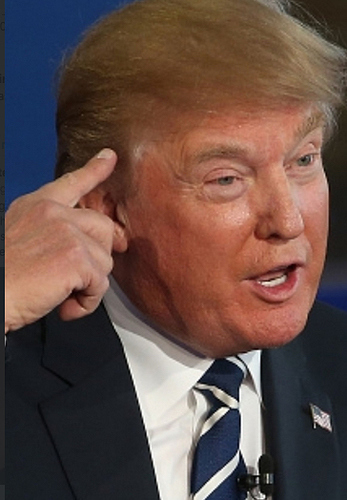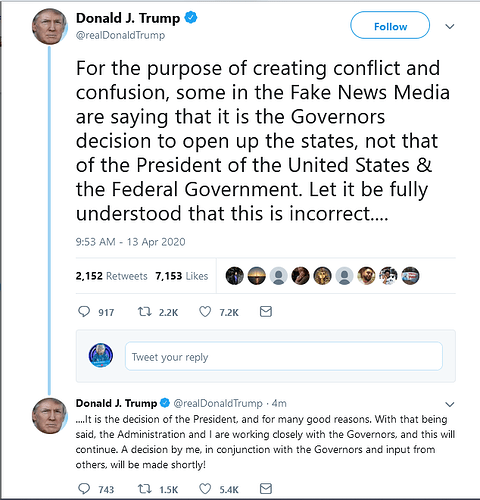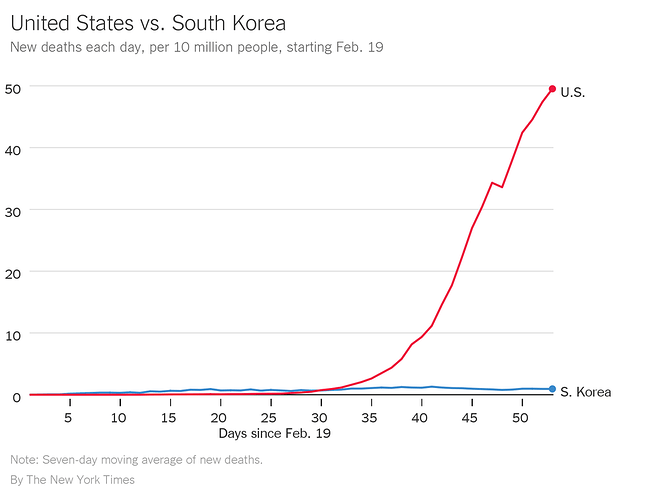


Compelling article on how we are going to be messaged to believe so many things…GASLIGHTING 101
https://forge.medium.com/prepare-for-the-ultimate-gaslighting-6a8ce3f0a0e0
Prepare for the Ultimate Gaslighting*
You are not crazy, my friends
You are not crazy, my friends. And so we are about to be gaslit in a truly unprecedented way. It starts with a check for $1,200 ( Don’t say I never gave you anything) and then it will be so big that it will be bigly. And it will be a one-two punch from both big business and the big White House — inextricably intertwined now more than ever and being led by, as our luck would have it, a Marketer in Chief. Business and government are about to band together to knock us unconscious again. It will be funded like no other operation in our lifetimes. It will be fast. It will be furious. And it will be overwhelming. The Great American Return to Normal is coming.
Under the bus 
Read: the “Red Dawn” emails
Quote…“the tip of the iceberg”
No question with all the patchwork approach towards keeping track of the sick, those who are most vulnerable (those over 65) have been deeply affected by coronavirus.
The under reporting of numbers says it all…there is a LOT more to come here.
The Latest on the Coronavirus
The new coronavirus has hit more than 2,100 nursing homes and other senior facilities around the U.S., killing over 2,300 people, according to a survey by The Wall Street Journal, an indication the pandemic’s toll in these facilities has been greater than the federal government has reported.
Nursing homes and other senior-living facilities in the U.S. have reported at least 15,473 coronavirus cases, according to data collected from 37 states that responded to requests from the Journal, which contacted all 50 health departments.
Families with mothers and fathers in nursing homes, or preparing to place a relative in a facility, have wanted to know the risks their loved ones face, advocates say. Yet disclosure practices vary, and there often isn’t information publicly available about individual facilities’ coronavirus cases.
The closest the federal government came to detailing the virus’s full impact on nursing homes came last month, when the Centers for Disease Control and Prevention reported there had been more than 400 long-term care facilities with coronavirus cases in the U.S. as of March 27.
…
The Centers for Medicare and Medicaid Services, or CMS, and the White House coronavirus task force have worked aggressively to protect nursing-home residents, taking steps that included banning nearly all outside visitors, CMS said.
“It ultimately tells us our efforts to prevent this have been ineffective,” said David Grabowski, a professor of health-care policy at Harvard Medical School.
Dr. Grabowski said the Journal’s tally is the most complete national total that he is aware of, but is likely “the tip of the iceberg.”
Yes, these communications really do indicate RED FLAGS starting going up in January relating to this new pandemic and the urgency it presented. They knew it was big, and looking at various official’s responses or questimates as to it’s impact on the US were telling.
Read the attached letter to listen to the inquiries being made…Unreal.
NYT Times accompanying article about these Red Dawn emails…T is getting nailed for his ‘halting’ response and inordinate numbers of those dying.
# He Could Have Seen What Was Coming: Behind Trump’s Failure on the Virus
An examination reveals the president was warned about the potential for a pandemic but that internal divisions, lack of planning and his faith in his own instincts led to a halting response.
WASHINGTON — “Any way you cut it, this is going to be bad,” a senior medical adviser at the Department of Veterans Affairs, Dr. Carter Mecher, wrote on the night of Jan. 28, in an email to a group of public health experts scattered around the government and universities. “The projected size of the outbreak already seems hard to believe.”
A week after the first coronavirus case had been identified in the United States, and six long weeks before President Trump finally took aggressive action to confront the danger the nation was facing — a pandemic that is now forecast to take tens of thousands of American lives — Dr. Mecher was urging the upper ranks of the nation’s public health bureaucracy to wake up and prepare for the possibility of far more drastic action.
“You guys made fun of me screaming to close the schools,” he wrote to the group, which called itself “Red Dawn,” an inside joke based on the 1984 movie about a band of Americans trying to save the country after a foreign invasion. “Now I’m screaming, close the colleges and universities.”
His was hardly a lone voice. Throughout January, as Mr. Trump repeatedly played down the seriousness of the virus and focused on other issues, an array of figures inside his government — from top White House advisers to experts deep in the cabinet departments and intelligence agencies — identified the threat, sounded alarms and made clear the need for aggressive action.
U.S. Tariffs Hamper Imports of Sanitizer, Disinfectants
Widespread shortages of hand sanitizer, disinfectants and other products needed to combat the spread of the coronavirus are being exacerbated by the Trump administration’s tariffs on Chinese imports, according to public filings by companies asking for exemptions from the levies.
Medical-supply companies and other importers have filed dozens of requests for tariff relief in recent weeks, the filings show. These businesses say the levies are increasing the costs of products needed to fight the pandemic and are, in some cases, contributing to shortages.
The article goes on to give many specific examples from different companies filings.
More of lack of readiness on T Administration from AP today…
As of Feb 10th - T had said "We’re very, very ready for this.”
NYT Times accompanying article about these Red Dawn emails…T is getting nailed for his ‘halting’ response and inordinate numbers of those dying.
# He Could Have Seen What Was Coming: Behind Trump’s Failure on the Virus
An examination reveals the president was warned about the potential for a pandemic but that internal divisions, lack of planning and his faith in his own instincts led to a halting response.
WASHINGTON — “Any way you cut it, this is going to be bad,” a senior medical adviser at the Department of Veterans Affairs, Dr. Carter Mecher, wrote on the night of Jan. 28, in an email to a group of public health experts scattered around the government and universities. “The projected size of the outbreak already seems hard to believe.”
A week after the first coronavirus case had been identified in the United States, and six long weeks before President Trump finally took aggressive action to confront the danger the nation was facing — a pandemic that is now forecast to take tens of thousands of American lives — Dr. Mecher was urging the upper ranks of the nation’s public health bureaucracy to wake up and prepare for the possibility of far more drastic action.
“You guys made fun of me screaming to close the schools,” he wrote to the group, which called itself “Red Dawn,” an inside joke based on the 1984 movie about a band of Americans trying to save the country after a foreign invasion. “Now I’m screaming, close the colleges and universities.”
His was hardly a lone voice. Throughout January, as Mr. Trump repeatedly played down the seriousness of the virus and focused on other issues, an array of figures inside his government — from top White House advisers to experts deep in the cabinet departments and intelligence agencies — identified the threat, sounded alarms and made clear the need for aggressive action.
’
On Feb. 10, Trump stood before thousands of supporters packed into a New Hampshire rally and declared: “By April, you know, in theory, when it gets a little warmer, it miraculously goes away.”
The crowd roared its approval at Trump’s unproven assertion. The Senate had acquitted Trump on the impeachment charges and the president shifted his focus toward reelection even as others in the administration keyed in on the virus.
Federal officials put the CDC solely in charge of developing a test for the virus and left out private interests, a choice that cost precious time when the resulting CDC test proved faulty.
Trump spent many weeks shuffling responsibility for leading his administration’s response to the crisis. He put Azar in charge of the administration’s virus task force before replacing him with Vice President Mike Pence toward the end of February. Even as the virus spread across the globe, prevailing voices in the White House, including senior adviser Jared Kushner and Treasury Secretary Steve Mnuchin, urged the president to avoid big steps that could roil financial markets.
The president had firmly linked his fate to Wall Street, and it took a tumble by the markets for Trump to ratchet up his response. In late February, while Trump was on a trip to India, the Dow Jones plummeted 1,000 points amid rising fears about the coronavirus.
Trump stewed about the collapse on his Feb. 26 flight back to Washington and lashed out at aides over comments made by a top CDC official, Dr. Nancy Messonnier, during a briefing the prior day, when she warned Americans that they would have to prepare for fairly severe social distancing.
“It’s not so much of a question of if this will happen anymore but rather more of a question of exactly when this will happen,” she said.
The White House announced that Pence would brief the media about the response that night. But Trump took the podium instead and has not relinquished the stage much since, belatedly making himself the face of the battle against the virus.
When Trump first took the lectern in the White House briefing room to speak about the virus, the U.S. had 15 coronavirus patients.
“We’re at that very low level, and we want to keep it that way,” Trump said. “We’re very, very ready for this.”
Tariffs? No problem… Don’t forget, trump is “like a real smart guy” & he “alone can fix it”. 
The Headline says it all really 
** Trump heralds disaster declarations in all 50 states and says US is ‘winning’**
Dr. Fauci this morning all but confirmed that lives could have been saved if earlier mitigation had taken place.
Dr. Anthony Fauci said Sunday that calls to implement life-saving social distancing measures faced “a lot of pushback” early in the US coronavirus outbreak and that the country is now looking for ways to more effectively respond to the virus should it rebound in the fall.
“I mean, obviously, you could logically say that if you had a process that was ongoing and you started mitigation earlier, you could have saved lives,” Fauci, the nation’s top infectious disease expert, told CNN’s Jake Tapper on “State of the Union” when asked if social distancing and stay-at-home measures could have prevented deaths had they been put in place in February, instead of mid-March.
“Obviously, no one is going to deny that. But what goes into those decisions is complicated,” added Fauci, who is a key member of the Trump administration’s coronavirus task force. “But you’re right, I mean, obviously, if we had right from the very beginning shut everything down, it may have been a little bit different. But there was a lot of pushback about shutting things down back then.”
South Korea plans to send 600,000 coronavirus testing kits to the United States on Tuesday in the first such shipment following a request from U.S. President Donald Trump, a Seoul official told Reuters on Monday.
Trump made the request for testing kits in a telephone call on March 25 with President Moon Jae-in, as the United States was grappling with fast-growing outbreaks in many states.
A U.S. Federal Emergency Management Agency cargo plane carrying the equipment is scheduled to leave at 10:30 p.m. (1330 GMT) on Tuesday, the official said on condition of anonymity due to the diplomatic sensitivity of the issue.
Trump is indicating this morning he may try to force the states to open on his own timetable.
Grocery workers are key during the virus. And they’re afraid
U.S. spy agencies collected raw intelligence hinting at public health crisis in Wuhan, China, in November
Current and former officials say there was no formal assessment in November but that there was raw intelligence that fueled formal assessments written in December.
5 Ways the U.S. Botched the Response to COVID-19
I don’t think the President has the power to force a state to reopen, I guess it depends on the state’s emergency management laws. 
I think the bigger question might be why is the President setting up a media showdown with the governors in the middle of a pandemic over who has the power? If there was a time for him to just walk the line instead of pushing the boundaries of the Presidential powers this would be it.
State emergency management laws usually define how a governor may declare and end a state of emergency. In some cases, the necessary response to a disaster is beyond the capacity of state and local governments. A state may petition the President to declare a major disaster. The declaration of a major disaster triggers a variety of federal programs depending on the scope of the disaster and the type of losses experienced.
I don’t think he does either, at all, but that may not stop him from trying to, and I worry that his rigged Supreme Court may back that.
The thing Captain Crozier pleaded not to happen has happened.
A USS Theodore Roosevelt sailor has died of COVID-19
If you were to write a playbook for how not to prevent a public-health crisis, you would study the work of the Trump administration in the first three months of 2020. The Trump White House, through some combination of ignorance, arrogance, and incompetence, failed to heed the warnings of its own experts.
‘Absolute Clusterf–k’: Inside the Denial and Dysfunction of Trump’s Coronavirus Task Force
Missed warnings, conflicting messages, and broken promises — how the White House fumbled its response to the worst pandemic in a century
Behind closed doors, Trump’s coronavirus task force boosts industry and sows confusion
“Jared and his friends decided they were going to do their thing,” one official said, referring to the president’s son-in-law. “It cost weeks.”
Trump Makes First Public Rebuke of Fauci With #FireFauci Retweet
Trump’s Role in the Death Toll
The United States and South Korea each had their first confirmed case of the coronavirus around Jan. 20. They each suffered their first death in late February. If anything, South Korea appeared to be slightly ahead of the United States, with more cases and more deaths, in early March.
But then the two countries began following very different paths.
From the beginning, South Korea took the virus extremely seriously, with widespread testing, tracking of cases and quarantining. The results have been impressive: Only about 220 deaths so far, and not a single day with more than a dozen deaths.
The situation in the United States, of course, has been radically different. About 2,000 Americans have been dying each day since early last week, and the United States now has the highest death toll of any country: more than 22,000 overall. In the chart above, you can see the number of new deaths each day for the two countries, adjusted for the population of each.
How did this happen?
There are multiple reasons that the virus has had such a different toll in different countries. But one of the reasons for the large toll in the United States is clearly President Trump. Over the weekend, The Times published a long story documenting the many warnings that he received throughout late January, February and much of March, about the likely severity of the virus and the need to take action.
He rejected those warnings, again and again. He chose a path of denial, rather than a path of aggressive response, as South Korea did.
In late January, several officials — including Alex Azar, the secretary of health and human services, and Peter Navarro, the trade adviser — told the president that the virus would likely do great damage unless the country responded. On Feb. 21, Trump administration officials conducted a meeting during which they discussed the need to close schools, cancel large gatherings and take other measures. On Feb. 25, a top disease expert in the government went so far as to make a public warning, only to be sidelined for doing so.
Each time, Trump’s response was a version of “stop panicking,” as The Times story explains.
He now conducts daily briefings where he tries to rewrite history, claiming that he knew it would be a serious problem all along. That is simply false. There is a long trail of evidence (including his own words) showing that he chose inaction over action, overruling the advice of scientists, public health experts and even some of his own advisers.
Hundreds more Americans are likely to die of the virus again today. For that, the president bears substantial blame.
Rick Santorum Admits Trump Can’t Force Governors to Reopen States
Even one of the president’s most passionate allies can’t defend Trump’s misleading tweets about his power to overrule governors.
Nearly 30% in the US believe a coronavirus theory that’s almost certainly not true
Peter Navarro dines on a fine meal of crow and feet.
White House adviser to 60 Minutes: Show me your pandemic story
He’s a maniac…WTF
Last one…Philip Rucker’s WAPO… it is probing and rings true.
Adding
Plenary = absolute WTF


